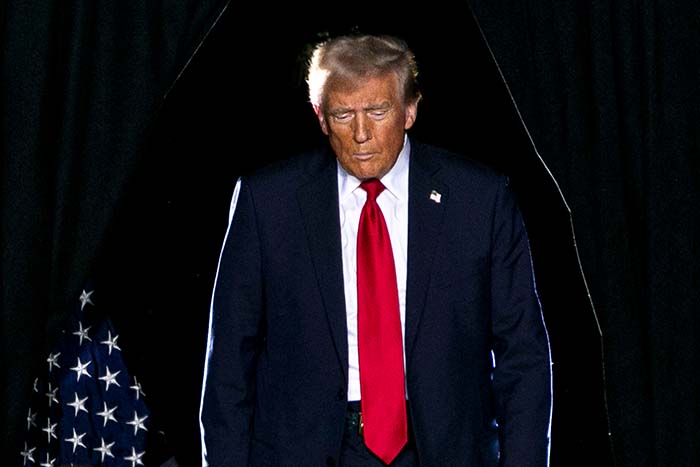Interviews / Energy and Raw Materials
12 November 2024
In the Face of Trump, Europe Must Promote a New Model Based on Sobriety.

Donald Trump’s election to the presidency of the United States is likely to have a decisive impact on the global fight against climate change. He has not concealed his ambition to liberalize and expand the fossil fuel sector, going against expert climate recommendations. This withdrawal by Washington, which will have numerous negative consequences, nonetheless leaves a gap in leadership on the climate cause, representing an opportunity for other powers, especially during COP29, which will take place in Baku, Azerbaijan, from November 11 to 22, 2024.
What might be the main energy and climate consequences of Donald Trump’s return to the presidency? Could COP29 see new initiatives emerge in response to climate change? In this context, what model can Europe propose? To shed light on these questions, we turn to Emmanuel Hache, research director at IRIS, a specialist in energy foresight and natural resource economics. His latest book, Métaux, le nouvel or noir (Metals, the New Black Gold), published by Éditions Du Rocher in September 2023, won the 2023 Marcel Boiteux Prize from the Association of Energy Economists and the 2024 Geopolitical Book Award from ILERI.
What are the main energy and climate consequences of Donald Trump’s election in the United States?
Donald Trump’s election to the presidency of the United States is certainly not good news for the climate. It could even represent a step backward on these issues. A Carbon Brief report published in March 2024, for example, showed that Trump’s election would result in an increase of 4 billion tonnes of greenhouse gas (GHG) emissions by 2030 compared to a scenario with a Democratic candidate. This figure roughly corresponds to the combined emissions of the European Union and Japan. Most importantly, it moves the United States further away from achieving carbon neutrality by 2050. From a geopolitical, climatic, and environmental standpoint, this represents a significant turning point.
Among the first measures likely to be announced are the United States’ withdrawal from the Paris Agreement, the dismantling of the Environmental Protection Agency (EPA), and the removal of methane emission taxes. Trump also plans to revive liquefied natural gas (LNG) exports by lifting the restrictions put in place during the Biden administration. His goal is clear on both the energy and economic fronts: eliminate regulatory and fiscal barriers to maximize the production and trade of fossil fuels (gas and oil).
Internationally, this policy could translate into a more pronounced protectionism, symbolized by import tariffs and a short-term, discretionary, and communication-based approach, reflecting the slogan “America is Back.” A recent report from the Centre for Prospective Studies and International Information (CEPII) highlighted that imposing, for example, a 10 percentage point tariff on all products from all countries except Canada and Mexico, and 60 percentage points on imports from China, would result in a global GDP impact of about 0.5% and a 3.3% reduction in global trade compared to their baseline scenario.
Trump’s election could lead to an increasingly fragmented world, with the United States seeking to reaffirm its energy leadership. Already a global leader in oil, gas, and LNG exports, the United States has considerable market power, which has been strengthened since the mid-2010s, and is in a position to expand its influence on global energy markets. The Trump administration could thus usher in a new era, aiming for greater dominance in these markets, a strategy that would directly impact importing countries, particularly the European Union, which relies on American exports. Donald Trump speaks of “Energy Dominance.”
What can we expect from the upcoming COP that started yesterday in Baku, Azerbaijan?
COP29 opens in a very uncertain context, as the world’s second-largest emitter of greenhouse gases (GHG), the United States, is expected to limit its commitments or, at best, show little enthusiasm for taking further action on climate change. This is particularly unfortunate since COP29 was initially intended to deepen discussions on climate financing, with the United States being the largest funder. Moreover, the next COP, scheduled in Brazil, was supposed to be a place for renegotiating GHG emission reduction targets for 2030 and 2050. Given that the United States is unlikely to announce any new ambitious policies, it is expected that there will not be significant progress. However, in general, a successful COP is one that leads to action, and we will see the momentum that future developments in climate-related issues will rely on.
Furthermore, given the climate emergency, there is reason to remain hopeful, and an unexpected positive outcome cannot be ruled out. There are already some positive signs: a global willingness to accelerate investments in renewable energy (2 trillion dollars in low-carbon technologies), energy efficiency, and the establishment of a Loss and Damage Fund. We can also envision the possibility of other countries asserting themselves in these COPs to make up for the void left by the United States. China, in particular, enjoys positioning itself in opposition to the United States. The future space created by the Trump administration could thus be a real opportunity for China to assert its global governance. In the past, Beijing has always shown a certain pragmatism, blending domestic objectives with a gradual international expansion. In the energy sector, China is now a leader in renewable energy investments and issues related to climate change (such as green finance), and it is likely to take the space left by the United States. Therefore, Trump opens the door for China to take a leadership role in both climate and potentially industrial matters, something he does not want. These are the unintended effects of his policy: leading to underestimated impacts in the economic, trade, and climate fields.
What can Europe do in this context?
In December 2022, as part of La Revue internationale et stratégique (RIS), we produced a dossier titled “Geopolitics of Sobriety”, which questioned the role that sobriety could play in international relations. In one of the articles (“Sobriety, a Vector of Power”), I specifically discussed how sobriety could be a means of assertion for economies that are poorly endowed with natural resources (oil, gas, metals, etc.). The election of Donald Trump presents an opportunity for the European Union to put this into practice. In the face of Donald Trump, Europe must promote a new model based on sobriety. The current geopolitical uncertainty compels European societies and governments to rethink their sobriety policies to reduce vulnerabilities linked to energy and critical materials—often overlooked or not considered in national strategies. Rather than focusing solely on their ability to increase domestic production or diversify suppliers, a systematic and systemic reflection on needs and uses would offer a more sustainable strategy, less exposed to electoral and geopolitical fluctuations. Sobriety could become an essential strategic resource, enabling European states to reduce their dependence, improve their trade balance, and enhance their energy and material security. By investing the savings generated in resilient infrastructures, these sobriety policies would facilitate both the moderation of future consumption and the reduction of greenhouse gas emissions. They would thus serve as a lever for international leadership for states committing to this dynamic. We are entering a new era, an age of sober powers, which will allow for genuine adaptation to the current geopolitical environment based on uncertainty. Through reducing consumption and simplifying material and technological needs, sobriety policies would strengthen both European resilience and attractiveness while deepening issues of sovereignty and value chains. This systemic sobriety requires a paradigm shift towards a long-term vision, integrating collective sobriety and individual responsibility for the well-being of all.

